|
|
|
Sort Order |
|
|
|
Items / Page
|
|
|
|
|
|
|
| Srl | Item |
| 1 |
ID:
116644
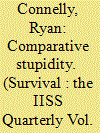

|
|
|
|
|
| Publication |
2012.
|
| Summary/Abstract |
It seems unlikely that a statesman like Georges Clemenceau could be elected in the West today. The son of a political activist, Clemenceau was sent to Paris for an education in medicine, but quickly became immersed in radical politics. He wrote for and founded several journals that attacked the regime of Napoleon III. He served one 73-day stint in prison, decided that was enough, and sought refuge in America just after he received his medical licence. He returned to France after its loss in the Franco-Prussian war, participated in the Paris Commune, and was one of the intellectual leaders of the movement to revenge the loss to Germany known as revanchisme. Early on, he was nicknamed 'Le Tigre' after his fierce style of debate, a reputation that followed him all the way to the office of prime minister.
|
|
|
|
|
|
|
|
|
|
|
|
|
|
|
|
| 2 |
ID:
116641
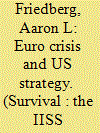

|
|
|
|
|
| Publication |
2012.
|
| Summary/Abstract |
For 45 years after the end of the Second World War, American strategists worried far more about Europe's perceived political, economic and military weakness than they did about its potential strength. Following the fall of the Berlin Wall and the end of the Cold War this pattern was briefly reversed. With the signing of the Treaty of Maastricht in 1992 the birth of a 'United States of Europe' seemed finally to be at hand. Possessed of a vast market and nascent institutions of central governance, this new entity was widely seen as having the potential to become a major player on the world stage.
|
|
|
|
|
|
|
|
|
|
|
|
|
|
|
|
| 3 |
ID:
116646
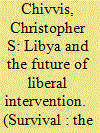

|
|
|
|
|
| Publication |
2012.
|
| Summary/Abstract |
The tragic assault on the US consulate in Benghazi on 11 September 2012 raised new doubts about the wisdom of the 2011 intervention in Libya. But while the attack put a question mark over Libya's transition, it did not change the fact that the intervention had toppled Muammar Gadhafi and opened the door to a better future for the country. Without it, hundreds, perhaps thousands, of innocent civilians would have died and the wave of rebellion sweeping across the Middle East and North Africa would likely have been slowed. It was a genuine if moderate success for the North Atlantic Treaty Organisation (NATO), for the United States, and most of all for Libya and the Libyan people. Success, however, was the result of no small amount of good fortune, and it could prove very hard to replicate, so before applying its lessons to other cases (above all Syria), it is critical to assess what was and was not accomplished in Libya, and why.
|
|
|
|
|
|
|
|
|
|
|
|
|
|
|
|
| 4 |
ID:
116645
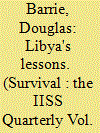

|
|
|
|
|
| Publication |
2012.
|
| Summary/Abstract |
After the Libyan regime of Colonel Muammar Gadhafi stepped up its military campaign against rebel forces in February and March 2011, in defiance of UN Security Council Resolution (UNSCR) 1970, pressure to impose a no-fly zone - which would require attacking the regime's air defences - began to mount. On 17 March, the Security Council, with China, Russia, Germany, Brazil and India abstaining, passed Resolution 1973 authorising nations to 'take all necessary measures … to protect civilians and civilian populated areas under threat of attack in the Libyan Arab Jamahiriya, including Benghazi, while excluding a foreign occupation force of any form on any part of Libyan territory'. It also imposed a no-fly zone across Libya, and authorised member states to take all necessary measures to enforce it. The resolution did not provide an explicit mandate to provide direct military aid to the rebels, which would probably have provoked a veto from Russia or China.
|
|
|
|
|
|
|
|
|
|
|
|
|
|
|
|
| 5 |
ID:
116647


|
|
|
|
|
| Publication |
2012.
|
| Summary/Abstract |
In recent months Israel's political and defence leaders have engaged in an unprecedented and vociferous public debate about Iran's nuclear programme, and about the advisability of an Israeli strike to destroy or delay it. Meir Dagan, the former head of the secret intelligence service Mossad, called an Israeli attack, at this time, 'the stupidest thing I have ever heard of', warned that it might ignite a regional war and stated that there was still a window of some three years, while the former head of the internal security agency Shin Bet, Yuval Diskin, stated that he did 'not trust' Prime Minister Benjamin Netanyahu's and Defense Minister Ehud Barak's 'messianic' leadership. The former chief of staff (2007-11) of the Israel Defense Forces (IDF), Gabi Ashkenazi, has been more restrained, but has made clear his opposition to an operation at this time, and even the current chief of staff, bound by the strictures of his office, has let it be known that he is not enthusiastic.
|
|
|
|
|
|
|
|
|
|
|
|
|
|
|
|
| 6 |
ID:
116648
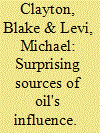

|
|
|
|
|
| Publication |
2012.
|
| Summary/Abstract |
Should countries care about where they get their oil? As Middle Eastern oil exports to Asia rise while shipments to the United States and Europe fall, analysts are asking whether this trade shift will have geopolitical consequences, drawing China politically closer to the Middle East while driving the West further away. In North America, the debate over the Keystone XL pipeline, which would have transported crude from Canada to the US Gulf of Mexico, featured proponents who trumpeted the value of relying on a friendly source of oil and sceptics who insisted that the origin of US oil imports doesn't matter. Throughout the world, many still worry that dependence on the Persian Gulf leaves countries exposed to blackmail; other analysts, though, insist that markets have rendered such threats impotent.
|
|
|
|
|
|
|
|
|
|
|
|
|
|
|
|
| 7 |
ID:
116650


|
|
|
|
|
| Publication |
2012.
|
| Summary/Abstract |
At a first glance, Turkey and Iran, two of the Middle East's most powerful neighbouring states, are on opposite sides of a bloody civil war in Syria where the protagonists are determined to fight it to the bitter end. The two countries are also jockeying for influence in oil-rich Iraq where Sunni-Shia and Arab-Kurdish divisions make for an unstable mix. It is thus understandable that this rivalry has been the focus of much commentary, but competition is not novel to these countries, and the intensity of their current rivalry may be exaggerated.
|
|
|
|
|
|
|
|
|
|
|
|
|
|
|
|
| 8 |
ID:
116649


|
|
|
|
|
| Publication |
2012.
|
| Summary/Abstract |
Since the Soviet collapse, Russia has been an issue in every US presidential election campaign. In 2008, Democrats accused the George W. Bush administration of endangering US security by needlessly antagonising Vladimir Putin's Russia and raising the level of tension between the two countries, especially during and after the Russo-Georgia war. Four years later, in 2012, the Barack Obama re-election campaign showcased the accomplishments of the reset policy. For its part, Republican nominee Mitt Romney's campaign faulted the administration for treating the Kremlin with kid gloves when Russia was, according to Romney, the United States' 'number one geopolitical foe' because it 'fights every cause for the world's worst actors'.
|
|
|
|
|
|
|
|
|
|
|
|
|
|
|
|
| 9 |
ID:
116642


|
|
|
|
|
| Publication |
2012.
|
| Summary/Abstract |
The twentieth century was a short century. It began late and badly, in 1914, with the megadeaths of an unexpectedly suicidal war that generated a fatally flawed peace in 1919 and set the stage for a de-humanising reprise 20 years later. Next, however, the century took an astonishing turn for the better as the United States assumed a Western leadership for which the states of Europe were no longer qualified, either on grounds of capabilities or morality. Later, the latter half of the twentieth century, inseparable from the first, proved to be a period of redemption: while Europe re-cast itself as a Union, American power forced history to change course in at least half the world, where an evil ideology was contained and ultimately defeated. When the Soviet empire and the state that had driven it collapsed in 1991, a tragic century of total wars ended early and well with widespread talk of a new world order - a US-led Western order.
|
|
|
|
|
|
|
|
|
|
|
|
|
|
|
|
|
|
|
|
|